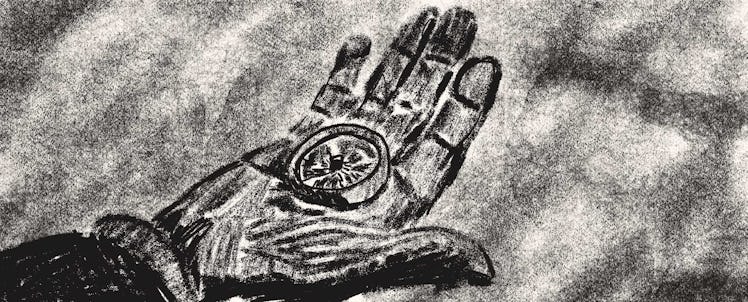Tyghe Trimble: Kids Need to Learn That Love Stories Are Messy
When it comes to love, every detailed story and neatly packaged piece of advice is a well-meaning fabrication. Sweet, but lies nonetheless.

Dear Emerson and Jodie,
When it comes to love, every detailed story, neatly packaged piece of advice, well-worn tale, or thoughtfully written letter (like this one) is not true. These are well-meaning fabrications, but lies nonetheless.
Let me explain by trying to tell you a romantic truth about love as your mom and I know it (I know, but please bear with me. It’s that kind of letter.)
Early in our courtship, your mom and I went on a date. At least I remember it as one. We were working together at the time and hiding our romantic intentions, and I’m pretty sure we hadn’t admitted that we were dating yet. Whatever the case, we went to the Apollo Theater to see the annual Double Dutch Holiday Classic. She showed up about an hour late into the three-hour event in part because we hadn’t negotiated the details of our meeting, and I had stupidly forgotten my phone. So I waited in the warm lobby as she stood shivering outside. We were both sort of pissed off when we finally met. We walked silently in, the gymnasium-sound of sneakers on a hardwood floor echoing off the hallowed walls of the Apollo. It was the show’s speed-jumping finale and the kids’ focus was intense, their preternatural skills on display, the crowd’s rapture palpable. It was instant zen.
In short, the show was brilliant (that’s why we started taking you when you were 4 months old). We laughed, cheered, jumped, danced, touched hands in celebration, and the two hours were gone in a moment. We left our seats, floated to the exit with a jubilant crowd, and were met with the silence of snow gently falling, a white blanket glistening in the Harlem streetlights. My stomach was upside-down and I was in love with your mom, with the night.
The spell quickly broke. We got on the subway where a particularly smelly man slept on the bench. Not yet practiced with moving together or reading each other, we walked awkwardly to the end of the car and tried to ignore the odor. We got off and made our way to a Chinese restaurant. I have no recall of where we ate because, by then, I was a nervous wreck. This was a rare opportunity, after all. Being out to dinner with your mother meant we were on an actual date (or at least so I thought at the time). So I choked on the first thing that went down my throat — some kind of soup. Like, really choked on it. I coughed through half the meal and then we left. There were no kisses, no hand-holding, or furtive glances. There was a smile from your mom — the beaming one she gives sometimes — and thanks.
That night did not cement our relationship. In fact, we went on for months in a sometimes frustrating, sometime thrilling orbital courtship that kept its gravitational pull because of, well, love — and respect, and mutual admiration.
So you don’t find this story very romantic. Beyond it not being a thrilling love story because this is your parent here (promise you, I understand), my bigger point is that this is what love looks like, at least in the eyes of your mother and father (I’ve fact-checked it with your mother, and she takes issue with some of the facts in the above passage, but agrees with the last statement).
I’ll give you this: It’s not romantic compared to say, reading The English Patient (“When we meet those we fall in love with…all parts of the body must be ready for the other, all atoms must jump in one direction for desire to occur”); or listening to something like the Yeah Yeah Yeah’s “Maps” (“Wait, they don’t love you like I love you”); or giving in to the pure romance of Rumi (“In one form upon this earth, and in another form in a timeless sweet land.”)
That is to say, your mother’s and my love stories — the unabridged ones — are not very good in the poetic sense. They’re messy. The romantic tension is all over the place. They’re missing the arc, the revelation, the cinematic resolution.
This is the reason no one can tell you all about love, why those expert romantic soothsayers are all full of it. The real joy of love, like life, is that you get to see it for yourself. The truth is yours.
What can a dad tell his kids about love? That you’ll make mistakes. That if you do not learn from them, you will make them again. That you will likely hurt others. That you must always feel that hurt and try to avoid inflicting it. That you’ll fail, and fail again.
Love is the greatest act of empathy. It is an attempt to see into the soul of another person. This is why all of the stories I know of love are part romantic, part bumbling quixotic adventure. There is no “wherefore art thou” Shakespearean moment (and if there were, we’d probably have been dead long before you were born). There is just the journey.
So when someone tries to tell you all about love, listen. There’s truth in there. But it’s not your truth. That’s for you to go and find for yourself.
With love (the parental kind — a different can of worms completely),
Dad
This article was originally published on